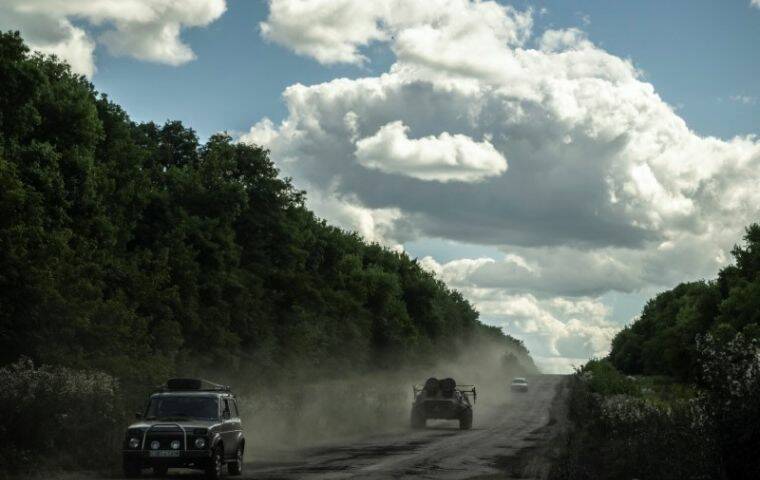Ukraine says it is still advancing in Russia’s Kursk region

REUTERS/VIACHESLAV RATYNSKYI
Ukrainian service members ride an Armoured Personnel Carrier, amid Russia’s attack on Ukraine, near the Russian border in Sumy region, Ukraine, on Monday.
KYIV >> Ukraine said today its biggest cross-border assault of the war to date had taken control of 74 settlements in Russia’s region of Kursk and was still advancing, making gains of one to three kilometers in the last 24 hours.
Ukraine blindsided Moscow by pouring thousands of troops into the western Russian region of Kursk last week in a surprise operation that has given Ukraine its biggest battlefield gains since 2022 after months on the backfoot.
President Volodymyr Zelenskiy said the operation had rounded up a number of Russian prisoners of war who could be swapped for captured Ukrainian fighters, touting what he described as a growing “exchange fund”.
“Despite difficult and intense battles, our forces continue to advance in the Kursk region, and our state’s ‘exchange fund’ is growing. Seventy-four settlements are under Ukrainian control,” Zelenskiy said.
“Preparations for our next steps continue,” he added, without elaborating.
Kyiv has deliberately given scant details of its operation, in stark contrast with last year’s counteroffensive that was flagged for months in advance and which foundered on well-prepared Russian defensive lines.
Don't miss out on what's happening!
Stay in touch with breaking news, as it happens, conveniently in your email inbox. It's FREE!
Kyiv’s claims of new gains came after Russian Major General Apti Alaudinov said that Ukraine’s troops had been halted. The Russian defence ministry said it had repelled attacks at villages about 16-17 miles from the border.
Reuters could not independently verify the situation on the battlefield.
A week after the start of the shock offensive, Kursk regional governor Alexei Smirnov called on residents to show patience and character.
“I’ll say it straight: the crisis has not yet been overcome,” he wrote on social media.
Russian President Vladimir Putin has vowed to hit back at Ukraine with a “worthy response” and accused Kyiv’s “Western masters” of giving Ukrainian forces help.
Washington, a key ally of Ukraine, appeared to try to distance itself from the incursion, with the U.S. State Department saying it was not engaged in any aspect of planning or preparation of the operation.
Zelenskiy has said that Ukrainian forces have taken control of areas in the Kursk region that Russia has used to launch more than two thousand cross-border strikes on Ukraine since June.
“Unlike Russia, Ukraine does not need other people’s property. Ukraine is not interested in taking the territory of the Kursk region, but we want to protect the lives of our people,” foreign ministry spokesman Heorhii Tykhyi said.
“It should be emphasized that the operation … helps the front line because it does not allow Russia to transfer additional units to (Ukraine’s eastern) Donetsk region, complicates its military logistics,” he said.
NO LETUP FOR NOW
Russian forces have been trying to advance for months on multiple fronts in the Donetsk region, taking advantage of their greater troop numbers to steadily inch forward towards cities like the Kyiv-held logistics hub of Pokrovsk.
For now, there is no sign of a letup for Ukraine in the east where Kyiv’s military said earlier it had recorded the largest number of battles with Russian forces on the Pokrovsk front in a single day since before the Kursk incursion.
Ukrainian military spokesman Dmytro Lykhoviy told Reuters they had noted a movement of Russian troops from Ukraine’s south to other areas, likely including Kursk, this week.
But he said the number of attacks had not reduced as a result and that it was too early to draw conclusions.
Pasi Paroinen, an analyst with the Black Bird Group, said that Russia had mostly relied on nearby military units to try to push back Ukrainian forces so far.
“Russians should have enough reserves, so that they should not be forced to weaken the “Centre” group of forces which is currently pressuring the Ukrainian lines near Toretsk and Pokrovsk,” he said.
Serhii Kuzan, chairman of the Ukrainian Security and Cooperation Center, a non-governmental research group, said the Ukrainian assault was an “asymmetrical” response to a positional war of attrition that Russia was trying to impose on Ukraine to exhaust its troops and resources.
Kyiv’s military today restricted the movement of civilians within a 20 km (12 mile) zone of the northeastern border area.
It cited an “increase in the intensity of hostilities” and the activation of Russian sabotage and reconnaissance groups, adding the measure was temporary and that residents could still access their homes by showing proof of registration.
Russia’s acting regional governor in Kursk said on Monday that Ukraine’s forces had taken control of 28 settlements in an incursion that was about 12 km deep and 40 km wide.
Though less than half of Ukraine’s estimate of its gains, the Russian assessment was a striking public admission of a major setback more than 29 months since Russia launched a full-scale invasion of its smaller neighbor.



